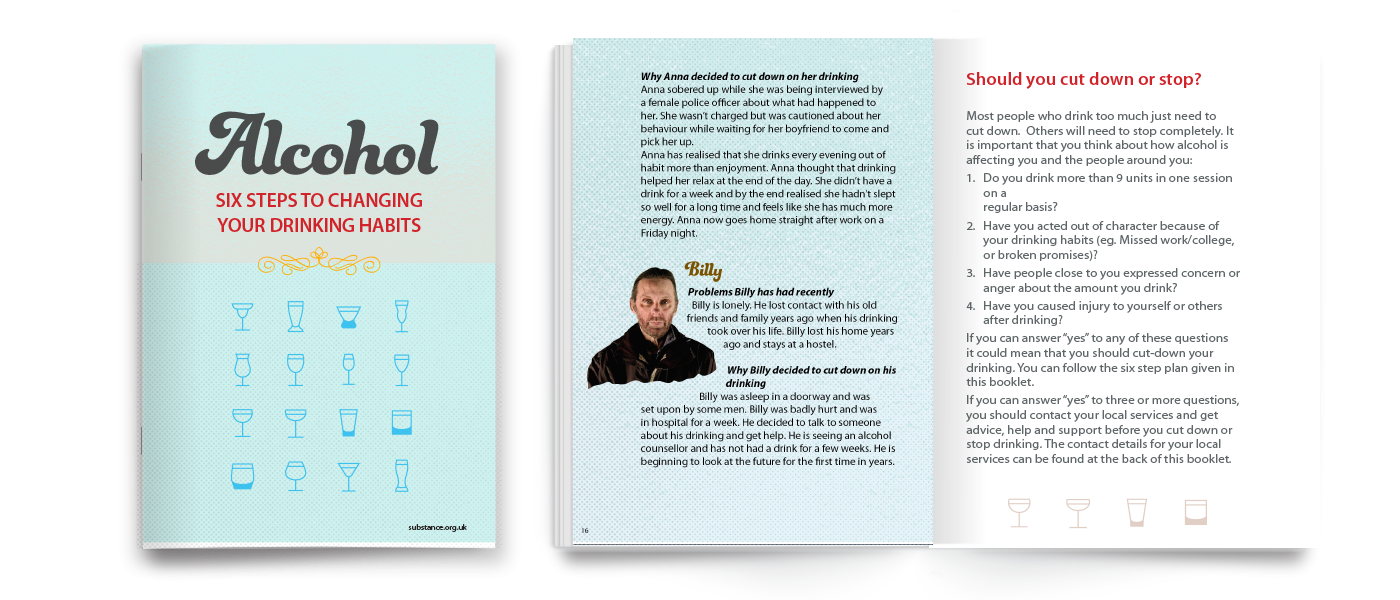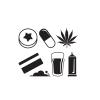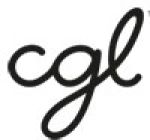HARM REDUCTION INFORMATION
This is the same harm reduction information we use in our drug & alcohol leaflets. Please feel free to use it in your own resources or websites. Alternatively, you can buy designed and printed versions of this information from the Substance shop.
Free to use
-
Only use for non-commercial purposes
-
Link to, or credit the Substance website
-
This email address is being protected from spambots. You need JavaScript enabled to view it. where you used the information
ALCOHOL SIX STEPS TO CHANGING YOUR DRINKING HABIT
What’s in this booklet?
For many people, having a drink with friends is one of life’s pleasures. However, for others, drinking can lead to a variety of problems
This is because they drink too much, too often. Alternatively, they may drink too much in one session and risk harming themselves or people around them.
In this booklet, we will follow the drinking habits of Lucy, Danny, Warren, Anna and Billy, consider their drinking patterns and if they need to make any changes. The Drinker’s Stories can help you assess own drinking habits and help you make decisions about your alcohol use.
Use the drinks diary on the inside back page to record the number of alcoholic drinks you have throughout the week. Work out the total number of units you drink, and decide if you would benefit from cutting down.
You can also use the techniques in the six-step plan to help you cut down on the amount of alcohol you drink.
Drinker’s Stories
In the first drinker stories, we are going to follow the drinking habits and problems of Lucy, Danny, Warren, Anna and Billy.
Lucy
Lucy is 18 years old and studying Leisure & Tourism at her local college. Lucy has a flat where she lives with her 18-month-old daughter, Britney. Lucy’s mum loves minding Britney when Lucy goes out and does a lot of childcare for her.
Lucy has lots of friends who enjoy meeting in bars and nightclubs at weekends.
Danny
Danny is 19, unemployed and still lives at home with his parents.
He and his mates often pass the time by drinking lager, and also enjoy Friday nights when they get completely bladdered.
Warren
Warren is 41 years-old and is a maintenance man for a gas company. Warren is married and has three children aged 7, 9 and 11.
Warren will go out for a few pints a couple of times in the week. About once a month he will spend Saturday with the lads, watching the match in the afternoon and then he carries on drinking all day and into the evening.
Anna
Anna is 34 years old and is a marketing consultant for a PR company.
She is very ambitious and tends to work long hours. Anna lives with her boyfriend. She likes red wine.
Billy
Billy is 62 years old and began drinking heavily about 20 years ago.
Billy drinks super-strength cider and beer or sherry. He decides what to drink when he sees what special offers the corner supermarket has on.
Units of alcohol
So, how do you know if you are drinking too much, too often? Firstly, you need to work out how many units you usually drink.
The amount of alcohol in a drink is measured in units. Different drinks contain different numbers of units. Different types of alcoholic drinks will have different amounts of units, which will determine their strength. You can calculate the amount of alcohol in any drink if you know the quantity of liquid and the percentage of alcohol it contains, this information is usually on a label stuck to the back of the packaging
We know you may not remember a formula when you are having a drink* so we have given a guide to the number of units contained in some popular drinks, on the facing page.
Work out the units in your drinks.
*If you can’t find your favourite drink, here is the formula so you to work it out for yourself:
Units = Volume (ml) x % alcohol (abv) / 1000
A guide to the number of units in some popular drinks
Pint or can of normal-strength lager | (Harp, Carling, Boddingtons etc.) | 2 |
Pint or can of strong lager | (Stella, Red Stripe, Corona, Kronenbourg etc.) | 3 |
Bottle of lager | (Budweiser, etc.) | 2 |
1-litre bottle of normal-strength cider | (Strongbow, Woodpecker etc.) | 4.5 |
1-litre bottle of strong cider | (White Lightning etc.) | 8 |
1 bottle of alcopop | (Bacardi Breezer, WKD, Smirnoff Ice etc.) | 2 |
75cl bottle of sherry | (QC, Harveys Bristol Cream) | 26 |
75cl bottle of port | 15 | |
75cl bottle of wine | (wines come in different strengths, so check the label) | 7 - 9 |
Large glass of wine in a pub | 3 | |
Standard-size bottle of spirits | (vodka, gin, brandy, whisky etc.) | 26–28 |
1-litre bottle of spirits | (vodka, gin, brandy, whisky etc.) | 40 |
A single pub measure of spirits | (vodka, gin, brandy, whisky etc.) | 1 |
How many units are too much?
It is known that the risks from alcohol start from any level of regular drinking and rise with the amount consumed.
In 2016 new alcohol guidelines, were set by the Department of Health. The guidelines recommend that both women and men should not regularly drink more than 14 units a week to keep health risks from alcohol low.
They have been set at this level to keep the risk of mortality from cancers or other diseases “low”.
If you do choose to drink that amount, it’s best to spread your drinking evenly over three or more days. If you wish to cut down on the amount you are drinking, a good way to do this is to have several drink-free days per week.
There are times when you will be at risk after drinking alcohol, so always avoid drinking alcohol before driving exercising or operating machinery.
Alcohol and your health
Cancer
Scientists have found that cancers are more common in people who regularly drink, with risk increasing the more you drink.
Heart
Although there is evidence that suggests drinking within the guidelines - for certain groups of people - may have a small protective effect on the heart, this can be cancelled out by the increased risk of other illnesses.
Pregnancy
Alcohol can increase the risk of miscarriage, low birth weight and developmental problems. It is not clear how much alcohol if any, it is OK to drink while you are pregnant. If you are pregnant or planning to become pregnant it is safer to leave alcohol alone.
Weight gain
Alcohol is packed with calories, a pint of beer can have the same calories as a slice of pizza, and a glass of wine as much as a cake, add that to the alcohol munchies and your waistline is only going one way.
Drinker’s Stories
How many units do Lucy, Danny, Warren, Anna and Billy drink everyweek? Are they over the recommended levels?
Lucy
Lucy will usually have three bottles of alcopops when she goes out twice in the week. At the weekend she will drink a half bottle of wine and up to 8 alcopops in a night.
Total: 46 units a week.
Over three times the recommended levels.
Danny
Danny will drink up to three cans of strong lager a day. At weekends he will pool money with friends and drink a quarter bottle of vodka before going to the pub drinking up to six pints of normal lager.
Total: 67 units a week.
Over four and a half times the recommended levels.
Warren
Warren will drink at least three to four pints of lager each night in the pub. If Warren is having a Saturday ‘session’ he can drink up to 15 pints of lager (plus a gram of cocaine).
Total: 78 units a week.
Over five times the recommended levels.
Anna
Anna drinks a bottle of wine at least four nights during the week. At weekends she may drink two or more bottles of wine.
Total 48 – 64 units a week.
Over four times the recommended levels.
Billy
Billy drinks at least four cans of super-strength cider or beer, or a bottle of sherry, every day.
Total: 16 – 25 units a day, every day.
This means he drinks up to 112 units a week. Eight times the recommended levels.
What are the benefits of cutting down on drinking?
If you drink above the recommended limits, you may have already experienced problems such as tiredness, gaining weight, hangovers or sometimes not being able to remember what you did the night before.
Overall, you won’t be in the best of physical shape. If you continue drinking at harmful levels you can develop more severe problems such as high blood pressure, brain damage and liver disease.
Alcohol affects judgement and the ability to control impulses. This can lead you to do things that you wouldn’t normally do when sober. You can embarrass yourself or others after drinking too much, have regretted sexual encounters or have arguments and fights.
Drinker’s stories
How will cutting down their alcohol benefit Lucy, Danny, Warren, Anna and Billy?
Lucy
Problems Lucy has had recently
Lucy has had a fair few regrettable incidents in the last few months. She has been leaving the bars and clubs with men she had just met. She has also been getting into arguments with other girls inside clubs and on the street, mostly about boys. She has been arrested and cautioned for assault and public disorder offences. Lucy has been called to appear in court on a charge of assault and affray.
Why Lucy decided to cut down on her drinking
For Lucy’s mum, this was the final straw and she told her that she will not be used as a free babysitter any more while Lucy goes out and gets drunk. Also, Lucy has had to tell people at her college what has happened and ask for a character reference, which they didn’t want to do. Lucy decided to stop keeping up with friends on a Saturday night and drank less, she found she enjoyed dancing in a club just as much, and for the first time in ages can remember getting home (alone).
Danny
Problems Danny has had recently
Danny’s benefits, most of which are spent on lager, means he often asks his mum for loans or to buy him clothes, causing big rows at home.
Danny meets a gang of friends in the city centre most nights where he will drink cans and smoke weed. He often gets into trouble with the police and he has recently been in court for breaking into a newsagents.
Why Danny decided to cut down on his drinking
Danny’s mother has had enough and tells him he has to leave home. After spending a couple of weeks staying at mate’s houses, Danny found he had nowhere to go.
Danny had to ask a support agency for housing advice. He is now in his first flat and on a training scheme. Danny hasn’t got the money to drink like he used to because he needs to pay his rent and bus fares. Danny is determined not to mess up this time.
Warren
Problems Warren has had recently
Warren was looking forward to his monthly Saturday session. However he has found that he can’t handle it like he used to, and by the end of the night he was feeling tired, confused and irritable. After waiting an hour for a taxi home, Warren had to take a pee in a shop doorway.
Unfortunately, a police officer was passing by and gave Warren a caution, which he didn’t take well. He was arrested and spent the night in the cells.
Why Warren decided to cut down on his drinking
Waking up in police cells on a Sunday morning was humiliating. Going home and explaining to his wife and kids where he had been was even worse. He had the added worry of people at work finding out he had been arrested.
Warren knows that this was a wake-up call and that his Saturday sessions had to be brought under control.
Realising that trying to explain to the lads that he was going to lay off the all day sessions was going to get him some stick from his mates, he made the decision to watch the match at his local pub instead, and then go home.
Anna
Problems Anna has had recently
Anna recently went for drinks on a Friday, straight from work after a very hard week. The bar near work had a deal where buying two glasses of wine meant you got the rest of the bottle free. She started off drinking with people from work but over the evening they left, Anna was too drunk to care and was talking to strangers. Anna can’t remember the last two hours she was out; nothing at all. The police picked up Anna off the street where she was sitting and crying, she couldn’t remember where she lived and had trouble standing – she had also lost her bag and coat.
Why Anna decided to cut down on her drinking
Anna sobered up while she was being interviewed by a female police officer about what had happened to her. She wasn’t charged but was cautioned about her behaviour while waiting for her boyfriend to come and pick her up.
Anna has realised that she drinks every evening out of habit more than enjoyment. Anna thought that drinking helped her relax at the end of the day. She didn’t have a drink for a week and by the end realised she hadn’t slept so well for a long time and feels like she has much more energy. Anna now goes home straight after work on a Friday night.
Billy
Problems Billy has had recently
Billy is lonely. He lost contact with his old friends and family years ago when his drinking took over his life. Billy lost his home years ago and stays at a hostel.
Why Billy decided to cut down on his drinking
Billy was asleep in a doorway and was set upon by some men. Billy was badly hurt and was in hospital for a week. He decided to talk to someone about his drinking and get help. He is seeing an alcohol counsellor and has not had a drink for a few weeks. He is beginning to look at the future for the first time in years.
Should you cut down or stop?
Most people who drink too much just need to cut down. Others will need to stop completely. It is important that you think about how alcohol is affecting you and the people around you:
- Do you drink more than 9 units in one session on a regular basis?
- Have you acted out of character because of your drinking habits (eg. Missed work/college, or broken promises)?
- Have people close to you expressed concern or anger about the amount you drink?
- Have you caused injury to yourself or others after drinking?
If you can answer “yes” to any of these questions it could mean that you should cut-down your drinking. You can follow the six-step plan given in this booklet.
If you can answer “yes” to three or more questions, you should contact your local services and get advice, help and support before you cut down or stop drinking. The contact details for your local services can be found at the back of this booklet.
Will cutting down on drinking be difficult?
For many, drinking has become a habit. If you change your routine and do different things you will find you don’t crave alcohol as much as you thought you would. When you are cutting down or stopping drinking, support from family or friends can be of great help.
However, if you are used to drinking regularly you may have a strong desire to drink alcohol. You should talk to someone at your local alcohol service and they can help you plan for a change in lifestyle.
Try the six-step plan for changing your drinking habits.
After reading this far you know quite a lot about the effects of alcohol and the problems it can cause to your health and your personal life.
In the following pages of this booklet. We have laid out a six-step plan, which can help you cut down on the amount of alcohol you drink.
Step 1
Identify good reasons for changing your drinking habits
Deciding on good reasons for changing your drinking habits will help you to succeed. What we mean by a “good” reason is one that makes sense to you. Right, now think of some good reasons for changing your habits.
There are dozens of good reasons to change your drinking habits, they will be different for each person. For example,
- more time for things you’ve always wanted to do
- save a lot of money and be able to spend it on other things you enjoy
- more energy
- lose weight
- less likely to have arguments with those around you
- less likely to develop serious health problems such as liver disease
Step 2
Set your goals
Having a plan for changing your drinking means you need to set goals to work towards. Pick a day when you are going to start your plan and set your daily drinking goals each week.
The next thing to do is to keep a record of your drinking – this will help you work out whether you are meeting your goals and staying on track. The main thing to remember if you don’t meet your goals is to keep on trying and to work out strategies to help you in the future.
Step 3
Recognise difficult times
No matter how much you want to change your drinking habits there will be times when you’ll find it difficult. These are known as high-risk times.
Stop and think for a moment about the last few times you drank too much. Where were you and what were you feeling?
The following is a list of common high-risk times. You can use this list to help you think about your own high-risk times. In the next section we will get you to think of ways of coping with these situations.
- after work
- when I am out celebrating at a party or a club
- when I have had a really difficult day at work or looking after the children
- when I want to relax
- when I feel lonely or depressed
Step 4
Deal with difficult times
You now have a list of the hardest times for you – so you’ve already worked out when you are most likely to drink. Now you have to work out how to deal with those difficult situations – without a drink in your hand.
Ways of coping with difficult times:
- avoid going to the pub after work – perhaps arrange
a different social activity, e.g. jogging, night class, new hobby. - avoid friends who drink heavily
- plan activities or tasks at those times that you usually drink
- when you’re bored or stressed have a physical workout or go for a walk instead of drinking
- eat a meal before drinking, it will make you feel more full and then you’ll drink less
- remind yourself that the craving for the drink will go if you occupy yourself with something else
- avoid drinking in “shouts” or “rounds”
- dilute your drink e.g., add soda to wine and mixers to spirits
- practise your reasons for refusing alcoholic drinks
Step 5
Find someone to support you
This plan is all about changing your habits. Some people find it easier to change a habit if they have someone to help them. This person could be your partner/friend or someone at work who also wants to change their habits.
Your support person should be someone you can talk to easily, be honest with, and can ask for advice when you need it.
If you are very worried about the effects of drinking on your health, your GP or nurse can help you. There are also special alcohol counsellors for this reason and telephone numbers are listed on the last page of this booklet.
Step 6
Stick to your goals
Drinking alcohol is an enjoyable part of many people’s lives – a habit that they’d feel lost without. This type of habit is hard to break. However, the information you’ve written down in this booklet will help you.
REMEMBER; Every time you stop yourself from doing something by habit, you are one step nearer to breaking the habit altogether.
Your Weekly Drink Diary
Use this page to record the alcoholic drinks you have throughout the week. To work out your total units, see the unit guide on page 7.
Day | Time, Situation | Number of drinks | Total Units
-
Monday
-
Tuesday
-
Wednesday
-
Thursday
-
Friday
-
Saturday
-
Sunday
Total Drinks
Total Units
Getting Help
If you feel your drinking is getting out of hand, consider talking to someone. Maybe a close friend, family, or a local advice project.
Here are some organisations that can also help you:
Talk to Frank
National drugs and alcohol awareness site
0800 77 66 00
www.talktofrank.com
Alcohol Concern
Alcohol Concern is the national agency on alcohol misuse campaigning for effective alcohol policy and improved services for people whose lives are affected by alcohol-related problems.
Addaction
UK - wide treatment agency, helping individuals, families and communities to manage the effects of drug and alcohol misuse.
www.addaction.org.uk
www.drinkaware.co.uk
Drinkaware aims to increase awareness and understanding of the role of alcohol in society, enabling individuals to make informed choices about their drinking and helps people who are concerned about their own or someone else’s drinking.
0800 917 8282
www.drinkaware.co.uk














